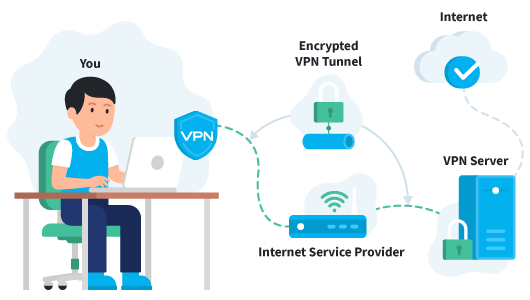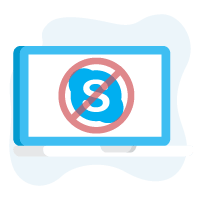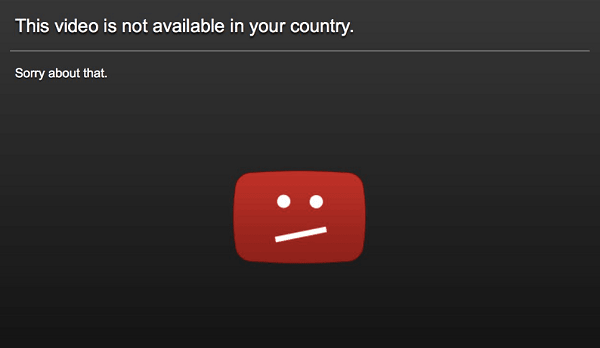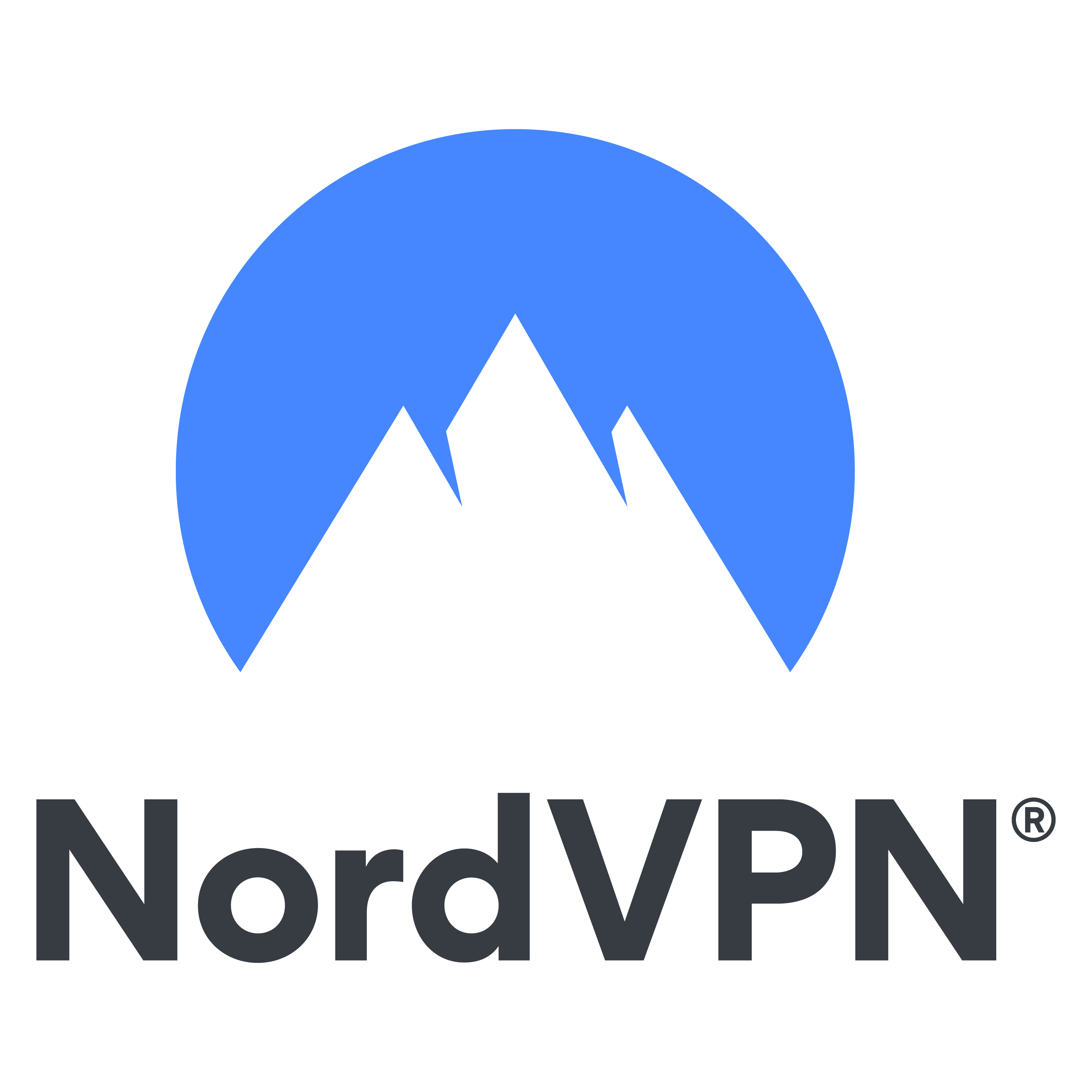Censorship on the Internet is becoming more and more common. Often there is a political reason for this. In some countries, certain news websites or social media are blocked because the government does not want citizens to have access to this information.
A VPN connection offers a solution for circumventing this censorship. Follow the steps below:
- Get a subscription from a good VPN provider, such as NordVPN.
- Download the VPN software on your smartphone, tablet, desktop or laptop.
- Start the VPN and connect to a server in a country where there is no censorship.
- You now have access to the blocked content, because your data traffic is redirected through a country where there is no censorship.
More information on how to circumvent online censorship can be found in the article below.
We associate online censorship with countries like China and Turkey but it will surprise you how widespread the problem is. To bypass these kinds of geographical restrictions you can use a VPN. If, for instance, the use of Facebook is banned in your country you can access the site via a VPN server in a different country. This way, it is like you are accessing the internet as if you were in that other country, thus gaining access to restricted sites and services.
In this article, you can read all about the different forms of online censorship and how you can bypass them with a VPN. In our eyes, freedom of speech is one of the most important basic human rights and we should protect it at all times. You will find out all you need to know about the censorship of social media, news sites, and other services below. Moreover, we will explain how a VPN can help you.
What Is Meant By Online Censorship?
What is Online Censorship? Internet Censorship is the suppression of what can be accessed or viewed on the Internet. It’s often carried out by governments for political reasons. Governments around the world choose to censor the web and block social media or news websites.
Luckily you can bypass internet censorship with a VPN.
Bypass Online Censorship with a VPN
It can be very annoying if, during your vacation or during your stay abroad, you are bothered by the applicable internet censorship of the country in question. For example, Facebook or WhatsApp may be blocked, or a certain website may be blocked.
A VPN is a good solution to the problem of online censorship. With a VPN you can bypass geographical restrictions in your country and regain access to social media and all your favorite websites.
Below we explain exactly how a VPN works.
How does a VPN work?
By using a VPN connection your internet traffic is encrypted. You connect via a remote server and your IP address changes.

When you use a VPN you can select the country you would like to access the internet from. The VPN sends your traffic via a server in that country and you access the internet not with your own IP address, but with the IP address of that server. To websites, it will seem like you are accessing them from the country you have selected. This way you can easily bypass the censorship in your country.
A VPN also has a lot of other benefits. You gain freedom with the possibility of bypassing geographical restrictions. This can, for instance, help you to watch the Netflix content of another country. But there is more!
The VPN also provides you with anonymity because your own IP address won’t be visible to anyone. With a VPN nobody will be able to connect your actions online to your location or person. Read more about the benefits of this anonymous browsing.
Lastly, a VPN offers great security. VPN software encrypts all the data on your computer. No hacker or government will be able to decipher this encrypted traffic. Your personal information and internet traffic are safe with the use of a VPN.
Best VPN Providers to Bypass Online Censorship
We have created a list of the three best VPN providers that can help you bypass censorship. For this list, we have combined our general list of the best VPN providers, with the features a VPN has to have to fight censorship.
One difficulty is that some countries have now started blocking VPN provider sites. We have selected those providers that have managed to stay available (almost) everywhere. Another important feature is the money-back guarantee. This way you can easily try out the service to see if it works. If it doesn’t work to your liking you can cancel the subscription and get your money back.
Although there are decent free VPN providers we wouldn’t recommend them for the purpose of bypassing online censorship. Free VPNs are often not safe and sometimes sell your data to other parties. Also, free VPNs often have data and speed limits.
Planning to use a VPN because you are going on holiday in a country where services are blocked? We advise you to install your VPN before leaving. Because, as mentioned earlier, the site of the provider could be blocked in that country.
Bypass Censorship with NordVPN
NordVPN is a very good and solid VPN provider that definitely belongs to the top. They offer a lot of servers all over the world for a very reasonable price.
Especially if you care about your privacy online, they are the provider for you! NordVPN cares deeply about your online security and does not keep logs.
NordVPN helps you to bypass geo-blocked content from around the world. YouTube, WhatsApp, Skype, blocked news websites; everything can be accessed anywhere in the world when using this VPN.
They also have a 30-day money-back guarantee so you can take your time to test if their services fit your needs.
- Excellent protection and a large network of servers
- Nice and pleasing application
- No logs
Bypass Censorship with Surfshark
Surfshark is a premium VPN for a very attractive price. This VPN is very suitable to bypass online censorship. For example, you can use the VPN when you are in a country where WhatsApp is blocked.
With good speeds and a stable connection, you can access the internet anonymously. The 30-day money-back guarantee gives you the opportunity to test if this VPN connection works in your (vacation) country.
- Very user-friendly and works with Netflix and torrents
- 30-day money-back guarantee. No questions asked!
- Cheap with many extra options
Bypass Censorship with ExpressVPN
ExpressVPN is at the top of most of our lists for a reason. ExpressVPN helps you obtain a stable and secure connection wherever you are. They have great customer support and user-friendly applications.
ExpressVPN is somewhat expensive but you do get the best quality in return. You will not need to worry about censorship with ExpressVPN because you can easily set up a connection that bypasses the geographical restrictions. This VPN will let you access Facebook and other blocked sites in no time.
They offer a 30-day money-back guarantee, so you can take your time to try out their applications.
- Very easy to use VPN
- Perfect for anonymous browsing, downloading, and streaming (i.e. Netflix)
- 3000+ servers in 94 countries
Examples of internet censorship
Online censorship is becoming more and more common. Countries such as China, Turkey, Iran, and North Korea are known for blocking access to social media. Facebook, Twitter, YouTube, and Instagram, for example, are being censored.
In addition to censorship on social media, countries also block specific websites. These countries deny citizens access to specific websites. Not only citizens are affected by this, travelers can also be affected by this censorship.
Below we discuss some examples of internet censorship.
Social Media Censorship
Social Media outlets are places where people can express their unfiltered thoughts and opinions. This can be a threat to some governments. Social media are a perfect way for large groups of people with the same ideas to assemble.
Governments that do not allow any opposition fear that social media can spark resistance. For this reason they will restrict or completely ban the use of certain media in their country. Luckily, there are ways around this and one of them is the use of a VPN.
Censorship of Facebook and Twitter
Twitter and Facebook are banned in a couple of countries, like China and North Korea. Moreover, there were several instances where countries have temporarily banned the use of these sharing platforms. Often this happens as a rash action against rebellion.
Facebook is ideal to create events and get large groups of people together. Thus, it can be very useful when you want to organize a protest. Totalitarian regimes, that do not allow resistance, closely watch social media and in some instances proceed to ban them. Of course, we would label this as blatant censorship.
Banning Twitter will often coincide with the banning of Facebook. Similarly to Facebook, Twitter is also sometimes temporarily banned or restricted. Some governments consider Twitter as a threat because you can use it to spread insubordinate messages. The reach of the opinion of their opposition might be great on Twitter which can threaten their regime. Everyone can issue requests for removal on Twitter. Notably, Twitter published that 90% of all removal requests come from Turkey. As of yet, Turkey has not blocked Twitter completely, only temporarily.
While completely blocking these sites is blatant censorship, other cases are slightly more complicated. It has proven to be difficult for Facebook and Twitter to check their websites for illegal content, like hate speech and terrorism. Moreover, laws are different in all countries. Some governments have pressured Facebook to take certain pages offline. Most often these are pages that are in conflict with the laws of that country.
You might not view the banning of terrorist pages as censorship, because it appears to be for your protection. But imagine your government has it out for kittens and they ban them on all social media outlets, would you still think that’s reasonable? Understandably, government actions of censorship have sparked large discussions. Luckily, we can find a way around social media censorship with a VPN.
In China, where Facebook and Twitter are banned, they have created an alternative to these services. The service, called Weibo, is a large sharing platform. However, the Chinese government monitors and censors Weibo. You will not be able to post everything you want on Weibo. There is a long list of forbidden words and phrases. Thus, though it presents itself as an alternative, it really isn’t. So if your country offers an alternative to banned services, it is always good to check the actual freedom that the platform will offer you.
Censorship of WhatsApp and Skype

Apps like WhatsApp and Skype that offer easy, free communication can pose a threat to both telecommunication companies and governments. These applications offer so-called VoIP services. VoIP (Voice over internet protocol) services are a way of communicating for free, via the internet.
Governments that block the use of these services often say they do so to protect telecom and internet providers. Or the internet provider might block these services because often they also own the telecom company. These companies that you pay so you can call or text someone, lose a lot of revenue when VoIP services are allowed. In a way, they are artificially keeping companies afloat that would have otherwise gone down.
There are also governments that restrict the use of Skype and WhatsApp for other reasons. Like the social media previously mentioned, Skype and WhatsApp can pose a threat to totalitarian regimes. They are a way of easy, unsupervised communication. For this reason, some countries decide to ban them. In some cases, they allow the VoIP service but apply spyware to them to monitor conversations. For instance, in China, you can only download an adjusted version of Skype. This version has spyware that allows the Chinese government to monitor chats and check for banned words.
Again, the Chinese government has allowed an alternative Chinese service to take over the market that in many other countries belongs to WhatsApp. This service is called WeChat, and like Weibo, the Chinese government heavily monitors it.
Read this article to learn more about censorship on WhatsApp. Learn more about censorship on Skype here.
Censorship of YouTube
The blocking of YouTube often has a similar motivation to the above-mentioned services. The freedom to post what you want and, possibly, reach a large audience is a threat to totalitarian regimes.
YouTube also applies censorship itself. Channels that, according to YouTube, contain ‘malicious’ content are made more difficult to find on the platform. YouTube also removes advertisements from such videos.
However, on YouTube, there also is the issue of distribution rights. Similarly to streaming services like Netflix, YouTube sometimes has to deal with copyright and distributors. Distributors restrict the countries in which a video is shown. You will see a message something like this:

Strictly speaking, this isn’t censorship but you can also bypass it with a VPN. Simply select a country that will give you access to the video of your choice. You can read more about this process in our article on watching American Netflix worldwide.
Blocked Websites
Besides social media censorship, individual sites are also subject to censorship. They might pose a threat to a government or the social order in a country. There are too many different sites that get banned. We will discuss the blocking of News sites because this is an important violation of independent journalism.
News Sites Censored
The blocking of news sites is a great danger to the freedom of speech. This practice is probably the clearest example of censorship. If a country doesn’t allow independent journalism it violates the freedom of speech. Often they will block news sites that support the opposition, or foreign news sites. Examples of countries where the press is heavily censored are Turkey and Iran.
Luckily, these news sites can often be accessed with the use of a VPN. A side-effect of the blocking of news sites by governments is that other news sites will be watchful of their content. They self-censor because they do not want to be blocked. This way, there are no independent journalistic outlets left. However, with a VPN, you can access impartial news sites like BBC News easily.
More recently, countries have started blocking “fake news” sites. This is something to be watchful of, because who can determine what is and is not fake news? For instance, the EU has created a task force that will check the internet for fake news, especially interested in fake news from Russia. Fake news can be very dangerous but censorship maybe even more so. Though the spreading of disinformation is becoming more and more of a problem we must be watchful of governments too eagerly blocking websites.
Pornographic Sites Censored
Pornographic sites are another type of website that suffer a lot of censorship. Some countries do not allow any obscene material on the web. Not all governments and cultures agree on what is obscene and what is not. While one country only bans pornographic websites, another country may even ban sites that sell bikinis. To impose a certain set of morals onto the citizens of their countries these countries use censorship.
Google Censored
Google will block certain sites if they think it could be described as justifiable censorship. These are pages that break the law in most countries such as, terrorism and child pornography. However, they are clear about the fact that they do not want to assist in political censorship. Because Google will not honor all the requests it gets, some countries decide to block their applications. For instance, China currently bans all Google applications.
Use Tor to Bypass Censorship
Tor (the Onion Router) is an online network that functions as an internet browser. It is used for encrypted, anonymous communication. The Tor network consists of thousands of servers worldwide. Tor works with different layers of encryption. The data traffic is cut up in little pieces that are subsequently encrypted and sent through several servers before it ends up with the user.
This process costs some time and for that reason, the Tor browser can be relatively slow. But however slow it is, it does make sure nobody can see what you do online. You can surf the internet anonymously and nobody knows who you are and where you come from. This way no one can restrict you either.
Tor is a gateway to the so-called “dark web“. There are many sites on the dark web that you can’t visit with a normal browser. People use Tor and the dark web because they don’t experience any censorship here.
However, the dark web has a dark side and is often associated with crime. The dark web is not regulated and it is easy to contrive malware there. For most people that want to stay anonymous online, a VPN will be an easier, better, and more secure option than Tor.
Tor functions as a search engine, which means it can be a solution to bypass restrictions on services that you access via a browser, like Twitter and YouTube. However, things that operate outside a browser are not affected by Tor. Thus, bypassing restrictions on programs like Skype and the applications of sites like Twitter and Facebook can only be done with a VPN. We would recommend the use of a VPN over the use of Tor anyway, because of the added benefits of complete freedom, anonymity, and security it offers.
Final Thoughts: How Can I Bypass Censorship Online?
Some governments censor online activity. Outlets like social media and news sites are a threat to their rule. For this reason, sites and services are banned in certain countries. For instance, you can unblock Instagram, TikTok, and Facebook from Russia!
A way to gain access to these restricted sites is with the use of a VPN. This will allow you to change your virtual location. Though Tor could be useful for visiting blocked websites, for general internet freedom we would recommend a VPN. Do you have a question about bypassing online censorship? Below we have listed the most common questions. Simply click on the question to see the answer. A VPN can help you to bypass online censorship. The VPN software encrypts all your internet traffic and hides your personal IP address. You can select a server in another country. The VPN sends your traffic via a server in that country and you access the internet with the IP address of that server. Websites will think you are accessing them from the country you have selected. This way you can easily bypass the internet censorship in your country. In countries with strict regimes such as China, Turkey, North Korea and Iran you see a lot of internet censorship. These countries are known for regularly blocking websites and social media. Luckily, there are ways to circumvent these forms of censorship. Read more in this article. We recommend ExpressVPN for bypassing internet censorship. This VPN has excellent security features. Their wide range of servers allows you to access censored content from anywhere in the world.



